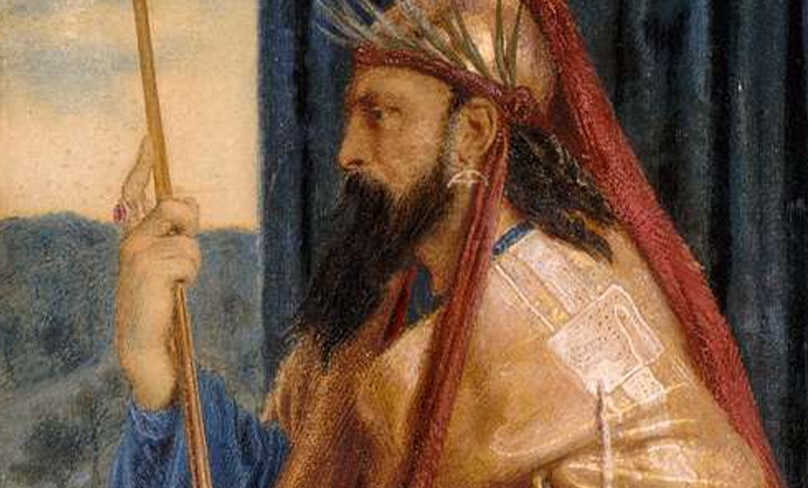
This is the edited text of the visitor’s address given by Archbishop Anthony Fisher OP at Sancta Sophia College, Camperdown, 19 September 2023
Amongst the grandest paintings in the Art Gallery of New South Wales is Sir Edward Poynter’s The Visit of the Queen of Sheba to King Solomon painted in the 1880s. It’s three-and-a-half metres high and over four metres wide and its sheer size and drama, as much as its colour and technique, captivate onlookers as they enter the southern gallery. Poynter was president of the Royal Academy and part of a group known as the “Victorian Olympians,” who sought to bring high classical ideals to life through vivid and romanticised paintings of classical antiquity, biblical narratives or ancient mythology. Late nineteenth century archaeological expeditions meant Egypt and the Middle East were flavour of the month, not just for the British Museum but for artists inspired by its treasures, and Sydney sports one of the greatest fruit of this orientalist craze.
The visit of the Queen of Sheba to King Solomon is recorded in the Old Testament (1 Kgs 10:1-13; 2 Chr 9:1-12). Poynter’s court of Solomon is a kaleidoscope of rich reds and golds. A beautiful queen on the left ascends stairs to the throne on the right, as the king offers her his hand, his wives seated in anticipation behind him. She comes bearing gifts—gold, gems and spices as in the biblical account, but also a monkey in our painting. Solomon responded by giving her “everything her heart desired” from this opulent palace of sprawling columns, tapestries, marbles, soldiers, servants, fruit and peacocks.
Before Solomon was known for his grandeur, however, he was famed for his wisdom: still to this day we speak of “the wisdom of Solomon”. As a young man genie-like God offered him a wish, and he said what he most desired was not sovereignty, gold or wife, but wisdom. This was granted (1 Kgs 3:4-9) and allowed him successfully to rule the unruly People of Israel, and to judge with a discerning heart, as in the famous case between two women who claimed to be mother of the same infant (1 Kgs 3:16-28). It was the judgment of Solomon that the Queen of Sheba celebrated after meeting him (1 Kgs 10:7), manifested not just in custody battles, but in the 3000 proverbs, songs and poems attributed to him as the ancient Pinterester or Instagram influencer.
But Solomon was human and eventually demonstrated all-too-human frailties. His wisdom as a governor brought him the power, wealth and women he had supposedly repudiated in his humble youthful wish. It meant he would think big, including building the Temple in Jerusalem, but also comfortable, and so he lived in sumptuous palaces with his 700 wives and 300 concubines! Such scale and comfort costs, and it was his people who paid the bills. In due course he built altars to rival gods at the request of some of his wives, and turned his back on the God who have given him with everything that made him great.
What might we learn from Solomon’s tale? On the one hand, young Solomon shows us that even when tempted by power and privilege, we can be aware of our limits and wisely use our gifts in service of the greater good. The youthful wisdom-seeking Solomon knew that for his kingship to succeed, he needed the cunning of his father King David. But worldly wisdom is not enough; however clever we are, we can lose our bearings and start to believe too much in our own efforts. We can forget the God from whom all wisdom comes, and our need to trust in him.
In Matthew’s Gospel, Jesus references the Queen of Sheba’s visitation to Solomon. He remarks to the religious authorities that they are witnessing something greater that Solomon here (Mt 12:42). Now the Pharisees knew their history. Solomon was one of their greatest kings, a military genius, builder of so much of their infrastructure, especially the first temple. He was so impressive that even royalty made pilgrimage to hear him. How dare this carpenter’s son claim to be greater than Solomon? He had no palaces, wives, gold or armies, no buildings, robes or crowns to boast of. He had nothing on Solomon.
But wisdom has many names, and one of those is λόγος, word, argument, reason. John’s Gospel opens by saying that “In the beginning was the Word, and the Word was with God, and the Word was God.” (Jn 1:1) Jesus is Wisdom, “the true light that enlightens everyone, coming into the world.” At the end of the Gospel he’s on trial and explains to the governor, “For this was I born and for this I came into the world, to testify to the Truth. And all who belong to the Truth listen to my voice.” There was a wisdom greater than Solomon, standing right before Pilate, and all he could say was “Truth? What’s that?” (Jn 18:38)
It is in and through Jesus that we find the intelligibility of creation and meaning of our lives. He is the source of goodness, truth, beauty, unity. Solomon built with stone and marble, the mansion Christ promises us in heaven (Jn 14:2) is built of faith, hope and love. Solomon’s temple and all his treasures eventually decayed or were pillaged and destroyed; Christ’s are eternal, where moth and man can do no damage. Solomon’s kingdom was built of heavy burdens on his subjects; Christ promises a light yoke, a kingdom of peace (Mt 11:28-30; Rom 14:17).
So here we are in the College of Sancta Sophia, Holy Wisdom. What kind of wisdom do you pursue? What inspires each one of you? May this place be known for something greater than all the treasures of Solomon’s palace: may it be a place for seeking a higher learning, for gaining a deeper wisdom. God bless you all!
